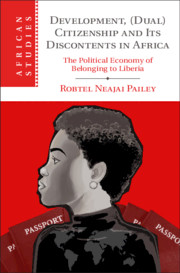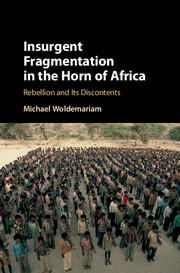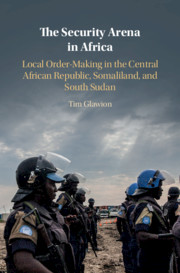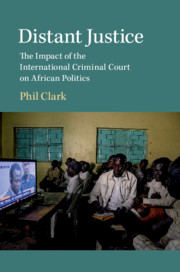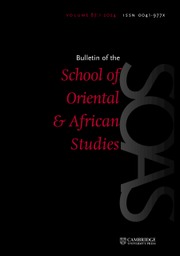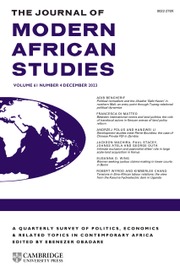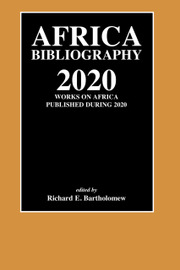Development, (Dual) Citizenship and Its Discontents in Africa
The Political Economy of Belonging to Liberia
$103.00 (C)
Part of African Studies
- Author: Robtel Neajai Pailey, London School of Economics and Political Science
- Date Published: January 2021
- availability: Available
- format: Hardback
- isbn: 9781108836548
$
103.00
(C)
Hardback
Other available formats:
Paperback, eBook
Looking for an examination copy?
If you are interested in the title for your course we can consider offering an examination copy. To register your interest please contact [email protected] providing details of the course you are teaching.
-
Drawing on rich oral histories from over two hundred in-depth interviews in West Africa, Europe, and North America, Robtel Neajai Pailey examines socio-economic change in Liberia, Africa's first black republic, through the prism of citizenship. Marking how historical policy changes on citizenship and contemporary public discourse on dual citizenship have impacted development policy and practice, she reveals that as Liberia transformed from a country of immigration to one of emigration, so too did the nature of citizenship, thus influencing claims for and against dual citizenship. In this engaging contribution to scholarly and policy debates about citizenship as a continuum of inclusion and exclusion, and development as a process of both amelioration and degeneration, Pailey develops a new model for conceptualising citizenship within the context of crisis-affected states. In doing so, she offers a postcolonial critique of the neoliberal framing of diasporas and donors as the panacea to post-war reconstruction.
Read more- An in-depth case study on citizenship construction and practice in Liberia, Africa's first black republic
- Draws on rich oral histories from over two hundred in-depth interviews in West Africa, Europe, and North America
- Examines how contemporary struggles over citizenship are impacted by historical policy changes on citizenship and ongoing public discourse on dual citizenship
Awards
- Winner, 2022 African Politics Conference Group Best Book Award
Reviews & endorsements
‘Pailey has broken new ground, creating the first in-depth scholarly examination of Liberian citizenship. Her engaging interdisciplinary study draws on over 200 interviews with Liberians and the diaspora to examine the 'political economy of belonging'. An invaluable contribution to the literature of citizenship and dual citizenship in Africa.’ Bronwen Manby, London School of Economics and Political Science
See more reviews‘In a global context of growing ferment in citizenship, Pailey’s brilliant historical and socio-anthropological account of the politics of belonging in and to Liberia exposes the games of power and privilege in claims, denials and contestations of citizenship and its materialisations.’ Francis B. Nyamnjoh, University of Cape Town
‘Pailey combines an in-depth understanding of Liberian society, politics, and economy that only an insider can possess with the thoroughness, nuance, and rigour of the best kind of outside academic research. The result is an analysis of identity and citizenship in Liberia that is as illuminating as it is convincing.’ Séverine Autesserre, Barnard College, Columbia University
‘Pailey weaves together theory, interviews and reflections from her own experiences navigating Liberia and the diaspora, bringing a richness to the discussion that makes the book accessible to a broad audience.’ Beth Elise Whitaker, University of North Carolina at Charlotte
‘Robtel Neajai Pailey is prominent among a new cohort of young African scholars who are reinvigorating the way we look at African societies, diasporas, mobility, conflict and citizenship.’ Nicholas Van Hear, University of Oxford
‘Pailey’s account of the Liberian story brings a fresh analysis to global development both in terms of the nation state itself, and the question of who decides development policy. This book is essential reading not only for political scientists and historians of African colonisation, but also for development policy makers and practitioners on how the voices of the diaspora should not be privileged over and above local voices, if tension and conflict are to be avoided.’ Patrick Kilby, Development in Practice
'This fascinating and innovative book is a must-read for researchers and policymakers working in the fields of migration, citizenship, diasporas and development as it offers fresh and alternative perspectives beyond traditional Eurocentric and Westphalian notions of citizenship.' Fulya Felicity Turkmen, The Washington Post
‘In this book, Pailey presents a fascinating and comprehensive overview of contestations over dual citizenship and the political economy of belonging in Liberia. The book broadens our understanding of citizenship and identity in the Liberian state as well as Africa more broadly through tracing the history of citizenship and displacement in Liberia as well as the tensions between what the author regards as homelanders (those in Liberia) versus diasporans (the wider Liberian diaspora in proximate countries and further afield).’ Thabani Mutambasere, International Migration Review
‘For a continent that too often sees its conflicts and subsequent post-conflict solutions reduced to regional, ethnic or religious identities, Pailey’s book is a refreshing and nuanced take on post-war peacebuilding. It illustrates that citizenship is not just a question of identity, nor is it a stagnant set of legal rights and privileges. Instead, it is constantly reconstructed and renegotiated through life experiences of Liberians that are shaped by the structural inequalities that impact the country and more broadly the African continent today.’ Baindu Kallon, Review of African Political Economy
‘Robtel Pailey’s compelling study of dual citizenship in Liberia touches on a question that is not only timely and relevant but also contested in many countries across Africa and beyond: how to (re-)frame discussions on citizenship in countries where large segments of the population are (temporarily) living outside of the national border but express belonging to their homeland. … this is an important contribution to our understanding of how citizenship is constructed in West Africa and beyond. What is more, the book is well written and accessible. The way the chapters are set-up makes it well suited for educational purposes in a number of academic disciplines such as anthropology, history, or political science.’ Maarten Bedert, African Studies Review
‘Robtel Neajai Pailey has made a significant contribution to the literature on the politics of citizenship and belonging in Africa. The book is exemplary in its masterful combination of rich qualitative analysis and careful historical narrative. Its detailed and highly accessible methodological, theoretical, and biographical reflections make it an excellent resource for both undergraduate and postgraduate students. Scholars with varying specialties, including citizenship, transnationalism, and post-war recovery would find much of value in this book, as would policy makers grappling with the thorny issues of dual citizenship and diasporic engagement.’ Kofi Takyi Asante, Global Citizenship Observatory
‘Development (Dual) Citizenship and Its Discontents is a significant contribution in thinking about the ways in which Liberians in-country and the diaspora conceive of citizenship, how their contemporary constructions of Liberian citizenship deviate or cohere according to their lived experiences and socio-economic positions, and how they practise citizenship in the everyday. With rich qualitative data and analyses, the book is a wonderful contribution to the extant literature on politics and citizenship, particularly when considering its relational, spatial and temporal aspects. It is a work that is accessible beyond academic circles in and enlivened by Pailey’s unique and engaging tone. It is a timely and important piece of work that deserves deep and wide engagement.’ Sibongile Zulu, Global Policy
‘… maps, in rich and precise detail, the contested political stakes and claims of diaspora communities. In doing so, this book places diaspora engagement within a web of contested legitimacies and disparate responses, upending a firmly entrenched view that diaspora engagement is a universal good. Furthermore, in illustrating how political subjectivities are practised in a ‘post-war’’ African country, the book is essential for centring African concepts of citizenship and debunking simplistic primordial identity paradigms.’ Jen Dickinson, The Journal of Development Studies
‘… Pailey employs actor-oriented analysis to great effect, interweaving impressions of citizenship definitions and the centrality of contributions to Liberia with dozens of interviews with homelanders as well as embassy officials and diaspora community representatives and everyday emigrants in Accra, Freetown, London and Washington. She provides ample space for extended quotes from her respondents, allowing the impassioned, the nuanced and the contradictory perspectives to animate her analysis. This approach illuminates the heterogeneity of how citizenship is performed and experienced in a variety of social-economic practices.’ Elizabeth Iams Wellman, Journal of Modern African Studies
‘Pailey’s theoretical work emerges from a multidisciplinary framing and a deep exploration of Liberia’s history. This is one of the best aspects of this book. She expertly combines history, politics, and development analysis with her empirical data in ways that broaden, trouble, and critique existing theories. This expands both the fields of political science and Liberian studies, as well as making the book both accessible and suitable for praxis.’ Caree A. Banton, Perspectives on Politics
Customer reviews
Not yet reviewed
Be the first to review
Review was not posted due to profanity
×Product details
- Date Published: January 2021
- format: Hardback
- isbn: 9781108836548
- length: 250 pages
- dimensions: 155 x 235 x 20 mm
- weight: 0.58kg
- availability: Available
Table of Contents
Introduction
1. Methodological, Theoretical, and Biographical Reflections
2. The Political Economy of Belonging to Liberia
3. Dual Citizenship and Its Discontents in Africa
4. Give Me Your Land or I'll Shoot!
5. Between Rootedness and Rootlessness
6. The Dichotomy of Diasporic Developmentalism
Conclusion
Appendix I. A Proposed Act to Establish Dual Citizenship for Liberians by Birth and Background
Appendix II. Dual Citizen and Nationality Act of 2019
Appendix III. Proposition #1: To Amend Article 28 of the Constitution to Provide for the Inalienability of the Citizenship of Natural Born Citizens of Liberia (Dual Citizenship).
Sorry, this resource is locked
Please register or sign in to request access. If you are having problems accessing these resources please email [email protected]
Register Sign in» Proceed
You are now leaving the Cambridge University Press website. Your eBook purchase and download will be completed by our partner www.ebooks.com. Please see the permission section of the www.ebooks.com catalogue page for details of the print & copy limits on our eBooks.
Continue ×Are you sure you want to delete your account?
This cannot be undone.
Thank you for your feedback which will help us improve our service.
If you requested a response, we will make sure to get back to you shortly.
×
